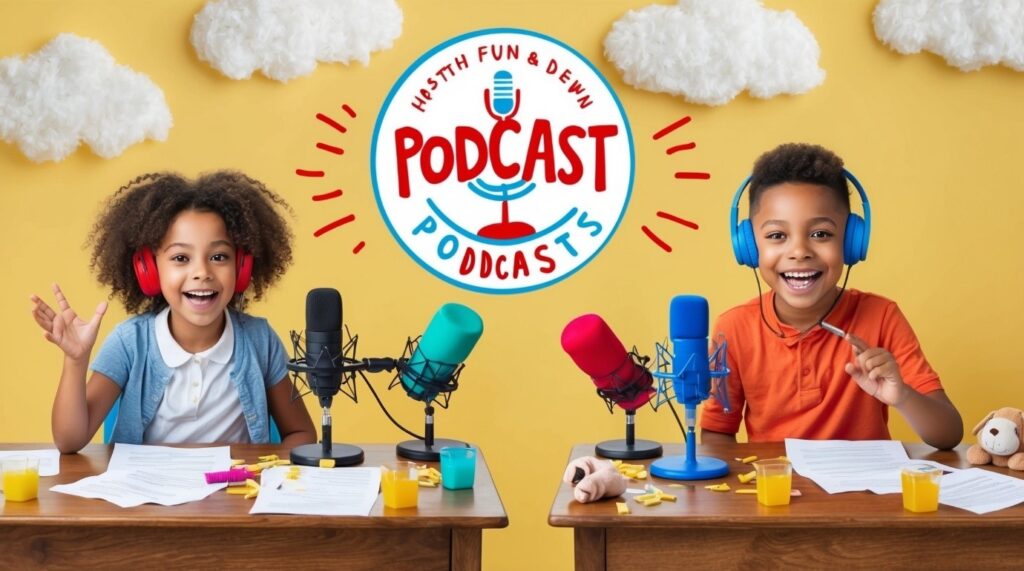Best Podcasts for Kids: Educational and Entertaining Options (Without Screens!)
In today’s digital age, kids are often surrounded by screens—whether it’s through smartphones, tablets, or TV. As parents, it’s natural to be concerned about how much screen time your child is consuming. However, there’s a fantastic alternative that doesn’t involve another device or app—podcasts!. This brings us to the best podcasts for Kids, educational and entertaining options without screen.
Podcasts for kids offer a refreshing break from visual media while still engaging young minds with captivating stories, fascinating facts, and educational content. These audio adventures stimulate imagination, improve listening skills, and can even be enjoyed as a family activity. Whether you’re looking for something educational to supplement school learning or simply entertaining content for road trips and quiet time, the world of children’s podcasts has something for everyone.
From science explorations and historical adventures to bedtime stories and musical journeys, the best podcasts for kids combine learning with fun in ways that will have your children asking for “just one more episode.” Let’s explore some outstanding options that will educate and entertain your little ones while giving their eyes a much-needed break from screens.
Podcasts offer an educational, entertaining, and screen-free option that nurtures creativity, boosts learning, and helps develop your child’s imagination. Whether it’s for road trips, downtime at home, or as a relaxing bedtime ritual, podcasts are an excellent way to engage your child without contributing to screen overload.
In this article, we will explore why podcasts are the perfect screen-free solution for kids, recommend the best options by age and interest, and offer tips for integrating podcasts into your family’s daily routine.

Learning, laughter, and adventure—educational podcasts that spark curiosity, all without a screen in sight!. Best Podcasts for Kids: Educational and Entertaining.
Why Podcasts Are Perfect for Kids: The Key Benefits
Podcasts offer more than just entertainment. They help kids develop various skills and enhance their learning experience. Here’s why podcasts are such an excellent choice for children.
1. Enhancing Listening Skills and Vocabulary
Podcasts encourage active listening, which is crucial for developing comprehension and vocabulary. Unlike videos, podcasts do not offer visual cues, requiring kids to engage their imagination and focus on the audio. This mental engagement helps children expand their vocabulary, retain information, and sharpen their listening abilities.
This audio-only format creates a fundamentally different cognitive experience than visual media. When children listen to podcasts, they must create their own mental images of characters, settings, and scenarios. This activates different parts of the brain than passive screen viewing, fostering creativity and deeper processing of information.
Additionally, podcasts can serve as excellent conversation starters between parents and children. After listening to an episode about science, history, or even fictional adventures, you can discuss what they learned or enjoyed, further reinforcing the educational benefits while strengthening your connection.
Pro Tip: If you’re looking to balance screen time with educational content, check out our article on How to Set Up Screen Time Limits on Android Devices: Reclaim Family Time.
2. Stimulating Creativity and Imagination
When children listen to podcasts, they engage in imaginative thinking. Instead of being visually entertained, kids visualize the story or content in their minds. This mental exercise enhances creativity, critical thinking, and problem-solving skills. Whether it’s a thrilling mystery or an adventure in outer space, kids learn to imagine scenarios and ideas based on what they hear.
Bonus Tip: After listening to an episode, encourage your child to draw their interpretation of the story or character. This hands-on activity can deepen their connection with the content.
3. Offering Screen-Free Time
In a world full of screens, podcasts provide a valuable opportunity for screen-free entertainment. They give children the chance to enjoy engaging content without the overstimulation of videos or games. Podcasts also allow parents to set healthy boundaries around screen time, which is essential in the digital age.
For more creative ways to limit screen time, be sure to explore our Digital Balance Guide: 11 Ways to Mix Online and Offline Family Activities.
Top Podcasts for Kids: Educational and Entertaining by Age Group
Now that you know the benefits of podcasts, let’s explore the best options for different age groups and interests. From fun science shows to captivating stories, there’s a podcast for every child!
|
Podcast |
Age/Focus |
Key Highlight |
Family Engagement |
|
Story Pirates |
Young Creatives |
Kids’ stories performed by actors |
Write a family story |
|
Wow in the World |
Science |
Fun scientific exploration |
Fact-sharing challenge |
|
Circle Round |
Cultural Learning |
Global folktales |
Cook/craft inspired by story |
|
But Why |
Curious Minds |
Kid-submitted questions |
Create curiosity journal |
|
Brains On! |
Young Scientists |
Kid-hosted science topics |
Do home science experiments |
Let’s look at these individually:
1. Story Pirates: A Creative Adventure for Young Minds
Overview: Story Pirates brings children’s stories to life in a fun and imaginative way. Professional actors and comedians perform original stories written by kids, creating a humorous and entertaining experience.
Why It’s Great: This podcast encourages creativity and writing. Kids can submit their own stories, and some may even get featured in the show!
Family Activity: Why not create your own family story? After listening to an episode, sit down and write a funny or adventurous tale together.

Where creativity and storytelling come to life!
2. Wow in the World: A Fun Way to Explore Science
Overview: Hosted by Mindy Thomas and Guy Raz, Wow in the World introduces kids to fascinating scientific concepts like animal behaviour, space exploration, and more. The show is packed with humour, quirky sound effects, and intriguing facts.
Why It’s Great: The fun, engaging format makes science entertaining and accessible for kids, encouraging a love for learning.
Family Fun: After listening to an episode, have a “Fact-Off” with your family, where each person shares their favourite fun fact from the episode. It’s a great way to continue the learning at home!
For more educational activities to complement podcast listening, explore our article on Top Educational YouTube Channels for Kids by Age Group: Screen Time That Actually Makes You Smarter.
3. Circle Round: Engaging Folktales from Around the World
Overview: Circle Round brings folktales from diverse cultures and traditions to life, with the help of talented voice actors. Each story has a valuable lesson, teaching kids about empathy, kindness, and cultural diversity.
Why It’s Great: These stories nurture an appreciation for different cultures and help foster empathy in children.
Family Activity: After listening to an episode, try cooking a meal or making a craft inspired by the story. It’s a great way to blend learning with creativity!
4. But Why: A Curiosity-Driven Learning Experience
Overview: Does your child have a million “why” questions? But Why answers curious kids’ questions about everything from the environment to how things work, all while being informative and fun.
Why It’s Great: This podcast allows children to get involved by submitting their own questions and learning from experts, making it an interactive and engaging experience.
Tip for Parents: Create a “But Why” journal to write down all the curious questions your child asks. Then, listen together and discuss the answers!
5. Brains On!: Science for Little Thinkers
Overview: Brains On! is a science podcast for younger kids, where kids host the show and explain topics like how the human body works or how food is digested.
Why It’s Great: The show makes complex topics accessible for young minds while incorporating fun sound effects and interactive elements.
Fun Extension: After listening to an episode, try out a hands-on science experiment at home, such as making a DIY rain gauge or exploring magnets.

Science experiments come to life after listening!
Incorporating Podcasts into Family Life: Creative Tips for Parents
Now that you have some podcast recommendations, how do you integrate them into your family’s routine? Here are a few tips to maximize the enjoyment and learning potential of podcasts. Entertaining.
1. Family Podcast Night
Set aside one evening a week for family podcast time. Each member of the family can pick their favorite episode from the best podcasts for kids that are both educational and entertaining. Afterward, share thoughts and questions about the content. This turns podcast listening into a bonding experience while promoting communication skills.
This simple routine creates a dedicated space for exploring diverse audio content together, from science adventures to historical tales to imaginative stories. Children benefit from hearing parents’ perspectives, while parents gain insight into their children’s interests and thinking. The discussion following each episode helps children process information critically and articulate their thoughts, transforming passive listening into active learning.
The best podcasts for kids offer content that sparks curiosity and conversation, making them perfect centerpieces for family discussions. As you explore educational and entertaining podcast options together, you’ll likely discover shared interests and opportunities for deeper exploration of topics that captivate the whole family.
2. Podcast Review Time
After listening to an episode, encourage your child to share their favourite part and discuss what they learned. This not only helps reinforce learning but also fosters critical thinking and communication.
For more family activities that encourage learning without screens, be sure to check out our Creating Tech-Free Zones at Home guide.
Maximizing the Learning Potential of Podcasts
Already using podcasts with your kids? Here are some additional ideas to take their learning even further.
1. Trivia Challenges
After listening to a podcast episode, turn it into a trivia game! Quiz your kids on key facts and details they learned. This is a fun way to keep them engaged and help reinforce the material.
2. Create Your Own Family Podcast
Encourage your children to create their own podcast! Whether it’s about their daily lives, family stories, or anything else they find interesting, recording and listening back will boost their storytelling and creative skills.
How Podcasts Can Help Reduce Screen Time
One of the greatest benefits of podcasts is their ability to reduce screen time while still offering engaging and educational content. In an age where screen time is at an all-time high, podcasts offer a screen-free option that promotes learning, creativity, and imagination.
Incorporating podcasts into your child’s daily routine provides a balance between entertainment and education, all while giving their eyes a break from digital devices.
For more ideas on how to limit screen time, check out our article on Navigating the Digital Age: A Parent’s Guide to Protecting Kids’ Eyes and Managing Screen Time.
By weaving the best podcasts for kids that are both educational and entertaining into your family’s daily life, you can encourage learning, stimulate creativity, and offer your child a break from screens. These carefully curated audio experiences provide the perfect balance of fun and knowledge, engaging young minds without the drawbacks of additional screen time. From science adventures and historical journeys to captivating stories and music exploration, quality children’s podcasts offer something for every interest and age group. So, what are you waiting for? Hit play and let the fun and learning begin!

Family podcast time makes the ride more fun and educational!
Further Reading: More Resources for Parents
If you’re looking for more ways to manage your child’s screen time and promote healthy habits, be sure to check out the following resources:

